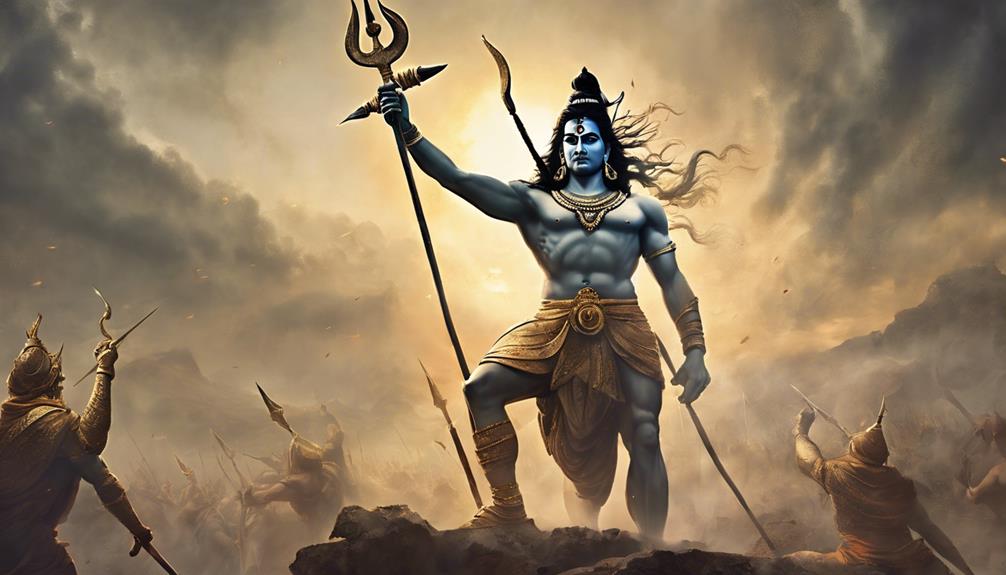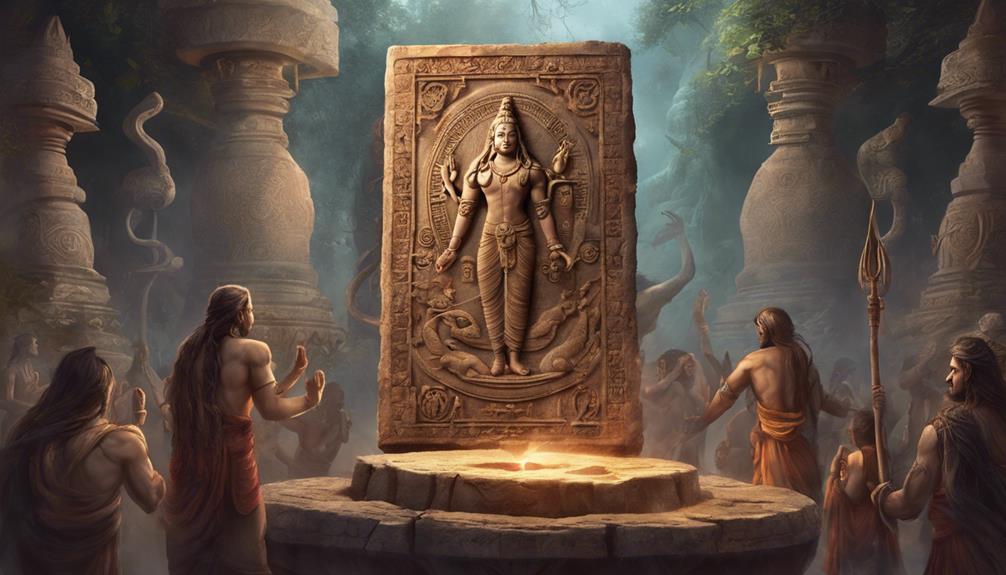Discover the profound teachings of Lord Shiva in sacred texts such as the Vedas, Upanishads, Mahabharata, Ramayana, Puranic verses, Agamas, Tantras, and Shaivism philosophy. These texts offer timeless insights into spiritual growth, self-realization, and the interconnectedness of all creation. Uncover the intricate woven wisdom that explores the essence of existence and the path towards enlightenment.
Table of Contents
Key Takeaways
- Vedas and Upanishads contain Lord Shiva's teachings on spiritual growth and meditation.
- Mahabharata and Ramayana depict Shiva's lessons on cosmic order, duty, and righteousness.
- Puranic verses offer Shiva's timeless wisdom and divine knowledge for spiritual growth.
- Agamas and Tantras explore Shiva's teachings on rituals, meditation, and inner transformation.
- Shaivism philosophy reveres Shiva's teachings on interconnectedness, self-realization, and spiritual growth.
Vedas and Lord Shivas Teachings
In the sacred Vedas, Lord Shiva imparts profound teachings that illuminate the path to spiritual enlightenment. Within these ancient texts, one can find Vedic insights that reflect Shiva's guidance on how to navigate the complexities of life with wisdom and grace. Shiva's teachings in the Vedas emphasize the importance of self-realization, meditation, and the pursuit of truth as essential components of spiritual growth.
Furthermore, the Upanishadic teachings echo Shiva's wisdom, delving deeper into the nature of existence and the interconnectedness of all things. Shiva, as portrayed in the Upanishads, serves as a divine teacher, offering profound insights into the metaphysical domains and the transcendent nature of the self. Through contemplation of these teachings, one can begin to unravel the mysteries of the universe and attain a higher state of consciousness.
Upanishads References to Shiva
Expanding upon the profound insights found in the Vedas, the Upanishads vividly depict Lord Shiva's presence and teachings, shedding light on the intricate connections between the metaphysical domains and the essence of the self. In the Upanishads, Lord Shiva is often portrayed as the ultimate reality, the source of spiritual insights and philosophical teachings that guide individuals on their journey towards self-realization and enlightenment.
Within the Upanishads, Shiva is described as the supreme being who transcends all limitations of time, space, and form. His teachings emphasize the importance of introspection, meditation, and the realization of one's true nature beyond the physical domain. Through profound dialogues and narratives, the Upanishads offer seekers a deeper understanding of the universe and their place within it, echoing Shiva's timeless wisdom.
Shivas Lessons in the Mahabharata

Explore the profound teachings of Lord Shiva in the Mahabharata, as they hold immense significance within the epic. Discover the key lessons imparted by Shiva that resonate throughout the narrative, offering invaluable insights and guidance to those seeking wisdom.
Reflect on how Shiva's teachings shape the characters and events in the Mahabharata, illuminating profound truths and timeless principles.
Mahabharatas Shiva Teachings
Exploring the depths of the Mahabharata, one encounters the profound teachings of Lord Shiva, imparted amidst the epic saga's intricate tapestry of narratives and lessons. Within the Mahabharata, Shiva imparts symbolic teachings that explore the essence of existence and the cosmic order.
His philosophical insights offer a deeper understanding of duty, righteousness, and the eternal battle between good and evil. Through the characters and events in the Mahabharata, Lord Shiva's teachings resonate with timeless wisdom, guiding readers to contemplate the complexities of life and morality.
The presence of Shiva's teachings in this epic serves to elevate the spiritual discourse, inviting individuals to reflect on the deeper meanings and profound truths embedded within the Mahabharata's rich narrative.
Significance in Epic
Within the intricate weave of the Mahabharata, Lord Shiva's teachings stand as profound pillars of wisdom, illuminating the path of duty, righteousness, and the eternal struggle between good and evil.
His lessons in the epic carry symbolic interpretations and allegorical meanings that explore deep into the human psyche and the cosmic order.
The mythological significance of Shiva's teachings in the Mahabharata transcends mere storytelling; they offer spiritual lessons that resonate with individuals on a profound level, guiding them towards understanding the complexities of life, morality, and the ultimate truth.
Through the interactions and guidance provided by Lord Shiva in this epic, readers are invited to contemplate the deeper meanings behind the narrative, revealing valuable insights that shape their understanding of the world.
Key Lessons Imparted
In the Mahabharata, Lord Shiva imparts key lessons that intricately intertwine duty, righteousness, and the eternal battle between good and evil, offering profound insights into the complexities of life and morality. His divine teachings in this epic provide a roadmap for spiritual enlightenment, guiding individuals on the path of righteousness and duty.
Through the interactions with various characters in the Mahabharata, Lord Shiva emphasizes the importance of upholding one's duties and responsibilities while also staying true to one's moral compass. The lessons he imparts serve as a beacon of light, illuminating the way for individuals seeking to navigate the intricate web of life's challenges and dilemmas with grace and wisdom.
Lord Shiva's teachings in the Mahabharata are timeless and continue to inspire seekers on their spiritual journey.
Ramayanas Insights on Lord Shiva

When exploring insights on Lord Shiva within the Ramayanas, one discovers profound teachings that illuminate the divine essence of the revered deity. In the Ramayana's perspective, Lord Shiva is often depicted as a symbol of destruction and transformation. Symbolic interpretations reveal that Shiva's role is vital in the cosmic balance of creation, preservation, and dissolution. Lord Shiva's presence in the Ramayana signifies the ultimate reality beyond the material world, reminding one of the impermanence of life and the importance of letting go of attachments.
Within the Ramayanas, Lord Shiva's teachings guide characters like Hanuman and Rama on their spiritual journeys. Hanuman's unwavering devotion to Lord Rama reflects the ideal devotee-disciple relationship, mirroring the deep reverence devotees hold for Lord Shiva. Rama's respect for Lord Shiva is evident in his adherence to dharma and righteousness, embodying the qualities of a noble and virtuous ruler.
Puranic Verses on Shivas Wisdom
Discover the profound Puranic verses that encapsulate Lord Shiva's timeless wisdom and teachings.
These sacred scriptures offer invaluable insights into the divine knowledge bestowed by the Supreme Being.
Explore the rich tapestry of Shiva's wisdom as revealed through the Puranas.
Key Puranic Verses
Within the sacred texts, the Puranic verses eloquently convey Lord Shiva's profound wisdom, illuminating the path of enlightenment for seekers. These verses offer symbolic interpretations that explore deeply into the essence of Lord Shiva's teachings, guiding individuals towards spiritual growth.
In mythological narratives, Shiva is depicted as the ultimate source of knowledge and enlightenment, with Puranic verses highlighting his role as the supreme deity who imparts wisdom to the universe. One such verse from the Shiva Purana states, 'Om Namah Shivaya,' encapsulating the essence of devotion and reverence towards Lord Shiva.
These key Puranic verses not only provide insights into Shiva's teachings but also inspire devotees to seek enlightenment and embrace the wisdom embedded in his divine words.
Wisdom From Scriptures
Discover the profound wisdom of Lord Shiva as revealed through the Puranic verses, which serve as timeless beacons guiding spiritual seekers towards enlightenment.
In the sacred texts, Lord Shiva imparts divine knowledge that transcends the limitations of the material world. Through verses filled with spiritual depth, Shiva illuminates the path to spiritual enlightenment, encouraging seekers to look beyond the physical domain and connect with the divine essence within themselves.
These Puranic verses convey profound insights into the nature of reality, the self, and the ultimate truth, offering guidance on how to navigate the complexities of existence with wisdom and compassion.
Agamas and Shivas Guidance

In the sacred texts, the Agamas explore profound teachings imparted by Lord Shiva, guiding devotees on the path towards spiritual enlightenment. These texts serve as a cornerstone for Agamic practices, offering intricate rituals, meditation techniques, and philosophical insights that form the bedrock of Shiva's guidance to his followers. The Agamas delve into the nature of existence, the importance of devotion, and the significance of righteous living, providing a roadmap for individuals seeking to deepen their spiritual connection with Lord Shiva.
Shiva's guidance, as elucidated in the Agamas, emphasizes the cultivation of inner purity, self-discipline, and unwavering faith in the divine. Through various ceremonies, mantras, and yogic practices prescribed in these texts, devotees are encouraged to purify their minds and bodies, aligning themselves with the cosmic principles that govern the universe. By adhering to the teachings found in the Agamas, followers can progress on their spiritual journey, ultimately attaining a profound understanding of themselves and their place in the world.
Tantras Interpretation of Shiva
As the Agamas illuminate Lord Shiva's teachings, the Tantras offer a distinctive interpretation of Shiva that explores the esoteric aspects of his divine essence. In the Tantras, Shiva is often depicted as the ultimate reality, transcending the limitations of form and time. The Tantras probe deep into the symbolism surrounding Shiva, portraying him not just as a deity but as a cosmic force that governs the universe.
The interpretation of Shiva in the Tantras goes beyond traditional religious practices to encompass a wide array of esoteric rituals and meditative techniques. These texts emphasize the importance of inner transformation and spiritual evolution through practices such as mantra recitation, yantra visualization, and meditation on the chakras. By engaging with these practices, followers seek to reveal the hidden meanings within the symbolism of Shiva and connect with his divine presence on a profound level.
Shivas Teachings in Shaivism

Shiva's teachings in Shaivism encapsulate profound insights into the nature of existence and the path to spiritual enlightenment, guiding followers towards a deeper understanding of the universe and their place within it. Within the rich tapestry of Shaivism philosophy, Shiva's teachings are revered as a beacon of divine wisdom illuminating the spiritual journey towards self-realization and union with the ultimate reality.
Shaivism philosophy, rooted in the worship of Lord Shiva as the supreme being, emphasizes the interconnectedness of all creation and the eternal nature of the soul. Central to Shaivism is the belief in attaining spiritual growth through dedicated practice, self-reflection, and devotion to Shiva. Shiva's teachings, passed down through sacred texts and oral traditions, offer profound insights into the nature of reality, the importance of ethics, and the significance of cultivating inner virtues.
Contemporary Relevance of Shivas Teachings
Delving into the contemporary landscape, the profound teachings of Lord Shiva continue to resonate with seekers of spiritual enlightenment, offering timeless guidance for maneuvering the complexities of modern existence. Shiva's teachings hold significant modern applications, providing spiritual guidance that remains relevant today due to its timeless wisdom.
In the fast-paced and often chaotic world we live in, Shiva's teachings on meditation and mindfulness offer valuable tools for individuals seeking inner peace and clarity. By practicing these ancient techniques, individuals can cultivate a sense of calm amidst the hustle and bustle of modern life. Shiva's emphasis on self-awareness and self-realization serves as a guiding light for those navigating the challenges of contemporary society, encouraging individuals to look inward for answers and fulfillment.
Moreover, Shiva's teachings on unity, compassion, and the interconnectedness of all beings are particularly relevant in today's globalized world. In a time where division and conflict often dominate the narrative, Shiva's wisdom reminds us of the importance of fostering harmony and understanding among diverse communities. By embodying these principles, individuals can contribute to creating a more peaceful and inclusive society.
Frequently Asked Questions
How Do Lord Shiva's Teachings in the Vedas Differ From His Teachings in the Upanishads?
When exploring Lord Shiva's teachings in the Vedas and Upanishads, you'll notice both similarities and differences. The Vedas emphasize rituals and ceremonies, while the Upanishads investigate into philosophical and spiritual aspects, offering deeper insights into existence.
Are There Any Specific Lessons or Teachings of Lord Shiva in the Mahabharata That Are Not Mentioned in Other Sacred Texts?
When exploring Lord Shiva's teachings in the Mahabharata, you discover unique insights not found elsewhere. His lessons, intertwined with epic tales, offer profound wisdom on duty, righteousness, and devotion, enriching your understanding of life's complexities.
What Unique Insights Does the Ramayana Offer on Lord Shiva Compared to Other Texts?
The Ramayana explores unique insights into Lord Shiva through symbolic representations and theological perspectives. It delves into cultural influences and philosophical implications of Shiva's role, offering a deeper understanding of his significance in the epic.
Are There Any Puranic Verses on Shiva's Wisdom That Are Commonly Overlooked or Not Widely Known?
Exploring the depths of Shiva's puranic wisdom can reveal hidden gems within overlooked verses. These lesser-known teachings offer profound insights into Lord Shiva's essence, guiding seekers towards a richer understanding of his divine nature and cosmic significance.
How Does Shaivism Specifically Interpret and Apply Lord Shiva's Teachings Compared to Other Sects Within Hinduism?
In Shaivism, interpretive differences of Lord Shiva's teachings lead to unique ritual practices. Devotees emphasize direct connection to Shiva, often through meditation and a focus on personal transformation. These practices distinguish Shaivism from other Hindu sects.
Conclusion
To sum up, the sacred texts that mention Lord Shiva's teachings are extensive and diverse, ranging from the Vedas to the Tantras. Through these ancient scriptures, one can gain profound insights into Shiva's wisdom, guidance, and teachings that continue to resonate with individuals seeking spiritual enlightenment.
His lessons are timeless and hold contemporary relevance, offering valuable guidance for managing life's challenges and embracing the path to self-realization. Lord Shiva's teachings remain a beacon of light for seekers on the spiritual journey.